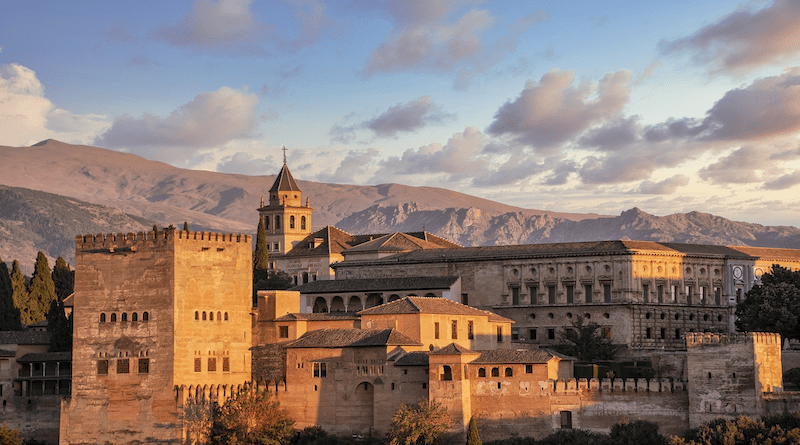Growing Saudi-Spain Ties Based On Deep Historical Roots – OpEd
By Arab News
By Jorge Hevia*
On Oct. 12, the National Day of Spain, we Spaniards solemnly commemorate a turning point in our collective history: Christopher Columbus’s arrival to the shores of America in 1492. The date chosen symbolizes a historical juncture, when Spain, about to conclude a process leading to the founding of a state based on our cultural and political plurality and the integration of various kingdoms under the same monarchy, began a period of linguistic and cultural expansion beyond European borders. It was then that a great process of fusion began — uniting initially Europeans with the American Indigenous populations and later with peoples from Africa — giving rise to the Latin America of our time. That was what the great Venezuelan intellectual Arturo Uslar Pietri called “the creation of the New World.”
Curiously enough, 1492 was also the year in which the Arab presence in the Iberian Peninsula concluded with the fall of the Kingdom of Granada, bringing to an end eight centuries of shared history, with both its bright and dark moments. It was an era that left lasting marks on Spain’s culture, language and society. This prolonged age of shared history is the foundation on which my country has forged a special relationship with the Arab world and, in particular, with Saudi Arabia.
Evidence of this extensive 800-year period can be found in many fields: In architecture, at monumental sites like the Alhambra in Granada or the palace of Medina Azahara and the Great Mosque of Cordoba; in the Spanish language, in a long list of words that can be traced to Arabic; in geography, in numerous towns and cities whose names have Arabic etymological roots; and in music, since we must remember that, according to various scholars, some of the roots of flamenco can be traced to the music of Al-Andalus.
For centuries, Al-Andalus — present-day Andalusia — was one of the regions of the Western world with the highest intellectual, artistic and scientific levels. In the 10th and 11th centuries, Cordoba became one of the most important cities in Europe, with students and scholars from all the continent’s capitals flocking to it. Mention must be made of figures such as Averroes (Ibn Rushd), one of the premier mathematicians of the time, as well as a philosopher, doctor and astronomer; the musician and poet Ziryab; the cartographer and geographer Al-Idrisi; and Abbas ibn Firnas, considered today a pioneer of aeronautics and the first man to fly. And Al-Gafequi, the Al-Andalusian oculist who wrote a treatise on his field entitled “The Right Guide to Ophthalmology.”
But relations between us transcend the past, as in more recent times these solid foundations have been reinforced by the fraternal relationship uniting our respective royal houses, not to mention the spectacular growth of our business dealings and major flows of tourists.
Spain is following with great interest the ambitious Vision 2030 modernization program. We wish to support Saudi Arabia in the development of a project that has rallied its society’s top talent and that promises to give a significant boost to the Saudi economy, reinforcing its leadership in the region and its prominence on the international stage.
In the political arena, there have been numerous visits in both directions. I would like to highlight the three trips made to the Kingdom by the Spanish minister of industry, trade and tourism; the visit by Saudi Minister of Foreign Affairs Prince Faisal bin Farhan to Madrid in June, during which he met King Philip; and those by the Saudi ministers of economy and tourism to Spain.
In the economic sphere, we are proud of the work done by Spanish companies in recent years. Projects such as the construction of the Haramain high-speed railway between Makkah and Madinah, the Riyadh Metro and the manufacture of five corvettes for the Royal Saudi Navy have marked a leap forward in our bilateral relationship. The challenge now is to sign new contracts that will allow our companies to build on the infrastructure and human resources they have established in the Kingdom in the last few years.
In the cultural field, we are striving to strengthen our relationships. For this, we have the assistance of the San Estanislao de Kostka school, the IE and ESADE business schools and the presence of several Spanish experts at the Kingdoms Institute in AlUla. And our great aspiration is to open a Cervantes Institute in Riyadh.
Just as this is a momentous time in the country’s historical development, relations between Spain and Saudi Arabia are witnessing a period of enthusiasm and excitement, with the regular initiation of new collaborative projects in a wide range of fields. At the Embassy of Spain, we are working with great determination to sustain this dynamic of growth and excellence.
- Jorge Hevia is Ambassador of Spain to the Kingdom of Saudi Arabia.

